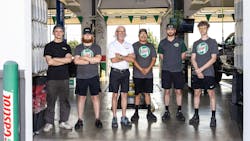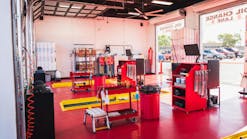If you ever find yourself steering a ship, running a quick lube shop may not be the first thing on your mind. But guiding a ship to safety and overseeing a successful business are two tasks that share some commonalities.
No one wants to feel lost at sea, either literally or figuratively. For quick lube service, this means keeping track of Key Performance Indicators and the day-to-day operational details that keep your ship afloat.
In the 2023 NOLN Operator Survey, NOLN asked respondents about many KPIs from car counts to gross sales, bay times and more. You’ll see some of that data reflected in the following pages. You’ll also hear from two shop owners who are in the same boat as you are–running a shop in an aftermarket filled with challenges and opportunities. You’ll read about what steers their ships, and the ships of survey respondents. What steers yours?
The Fix-It Mentality
Robert Weissberg is the owner and operator at the helm of a co-branded Midas-SpeeDee location in Watsonville, California. Due to the nature of his shop’s setup, Weissberg and his team are able to accommodate a wide range of services.
“Our funnel of services (is) pretty wide, so we’re able to do alignments, tires … you name it, we can do it,” Weissberg says.
Weissberg’s bay setup can service four oil changes at a time. On the repair side, they have the ability to bring cars in on both sides of the floor facing each other. In total, it adds up to about eight or nine bays. The shop also conducts California emissions testing and state inspections.
In terms of service trends, Weissberg resonates with a commonality that is seen across many shops: Customers are keeping their vehicles longer. He also sees some drivers switching over to electric vehicles.
Weissberg says California is very environmentally focused as a whole, therefore there are many customers and drivers that fit into that mentality. This leads to a larger population of EVs than may be seen in other parts of the country. This influx has inspired some additional learning opportunities.
“(As far as) pivoting, trying to understand or get around the new EVs, especially in California … we’ve taken classes, we’re trying to get our technicians evolved with that, and new innovation,” Weissberg says.
Beyond EVs, technology across the aftermarket is another element that Weissberg is keeping his eye on.
“We’re really heavy on diagnostics, so we have a lot of scan tools. If you’re really going to think about pivoting, that’s probably the next … change in our industry,” Weissberg says. “We’re going to have to be very well equipped to … the big influx of the different cars (and) computers that we have to communicate with and be able to diagnose.”
Weissberg sees traditional oil changes and general maintenance continuing to grow and bring in customers. Overall, his shop is up about 7% this year compared to last.
“I always have the saying, ‘We live and die by our car count and ticket average,’” he says.
Taking a look at key components has the opportunity to reveal different trends. Weissberg has seen shifts at his own shop, and he also sees the larger impact of the greater industry at play.
“Car volume, car count, all those things are very important but at the same time I think car count is down with our customer count, but ticket average is up,” Weissberg says. “What has happened is, the industry is in a fluctuation period. But at the same time … the lube side of it, was about not loss leaders, but getting oil changes in, preventative maintenance stuff (and) ancillary sales. We were focused on pricing.”
He mentions the need to stay competitive, but not so much so that it’s impacting car counts. Time is the value.
“We are now realizing that we can charge a premium for our service because we are giving you the most valuable thing, and that’s time,” Weissberg says. “We are getting your car in and out in a 20-minute time period and you’re on your way.”
Weissberg compares this to what may happen at a dealership, where customers can’t necessarily get something like an oil change done fast. The structure doesn’t necessarily allow for the approach that quick lube shops take. Even though Weissberg believes in the quick model, he understands the need for modern innovation as well.
“We have to adapt because … we don’t have warranty work. We don’t have fixed repairs that are driven into our locations,” he says. “So we have to adapt to be able to service anything that’s after. We’re a five year after, right?”
Weissberg says consistent customer service is important in order for shops to succeed, and keeping technicians trained allows shops to adapt as necessary.
“The way we stay innovative is by being cutting edge (and) keeping our techs trained,” Weissberg says. “The ability to know more of the vast range of cars and being educated that way.”
Despite industry-wide challenges such as finding the right skilled employees to fill positions, Weissberg sees the opportunity for a new generation of qualified techs. He even cross-trains at his shop to allow those who work on the lube side to help service the repair side, and vice versa.
“The learning curve from a new technician coming into our industry and getting proficient is huge, but if you have somebody that has the ability to train and understands the learning curve of that, then you’re able to get that person rolling a lot faster.”
But ultimately, for Weissberg, success comes down to the simple things.
“You have to fix cars. If you’re in the automotive industry and you’re not fixing cars, you will not get repeat customers,” Weissberg says. “You have to fix cars, and fix cars the first time, and be very service-minded about customer service. We are in the customer service business.”
The Quality Factor
In Burleson, Texas, Brett Morrison steers operations as the owner of a Castrol Premium Lube Express location. Morrison’s shop has three bays and eight to nine full-time employees.
“We try to stay real focused on what we’re doing, so mainly quick lube … we do a few tire rotations (and) we’re probably one of the only shops in town that does a lot of diesel oil change and fuel filters,” Morrison says.
His shop also does light A/C work, and while they don’t replace parts, they will do tasks such as a freon top off. Another service was added more recently and was inspired by the relationships Morrison’s shop has built with the local police and nearby fire department.
“The chief of police, he’s now a friend of mine that I had known through the shop, came in and asked if we could do something about the catalytic converter situation,” Morrison says. “So based on his suggestion, we brought in cat etching.”
But when Morrison looks at the oil changes being conducted, there are several details that he keeps in mind.
“One of the things I look at when we just look at specifically oil changes is where are they going? Is it conventional? Is it the high mileage? Is it the full synthetics? When we opened, we had a lot of conventional oil changes,” Morrison says. “Today, it is so minute it’s barely on our radar. Most of the people that come in here come in for a full synthetic oil change.”
Morrison says this includes the customers that are maintaining their older vehicles rather than buying new. Considering the age of the average vehicle on the road has increased in recent years, it’s an important factor.
“A lot of those 12-year vehicles are still that high end full synthetic oil or people are wanting to put in a higher end oil, not just the conventional maybe a synthetic blend or a high mileage oil,” Morrison says. “Because of that it drives our ticket prices up.”
The trend at Morrison’s shop is a move away from conventional oil changes and towards higher-end oil changes. His shop does not offer coupons or promotions outside of the giveaway item promos sometimes offered by Castrol. Morrison says this means customers seeking a lower end conventional oil change may choose to go somewhere else. But in turn, this raises the shop’s average ticket.
“I do see a change in the number of customers that are coming in and the average ticket both, and it’s growing and that’s something that I personally look at every day,” Morrison says. “I try to stay within a 30-day window, but I always look back to where (we were) this time last year. So, we’re showing really good percentage increases every month and I think a lot of that is due to those lower end customers going somewhere else and we’re getting a bigger majority of the higher end customers that are buying the $100 plus oil changes rather than the $50 oil change.”
Another big focus for Morrison is efficiency. For example, when COVID hit, his shop didn’t close. He implemented an immediate stay-in-your-car model to protect his staff and keep his customers comfortable. It had a lasting impact.
“We never got off of that. It improved our workflow tremendously, just by doing that one little thing. And we got great feedback from the customers, they all love it,” Morrison says. “I’m going to guess that it probably increased our efficiency by at least 20%, maybe 25%.”
This increase came from a quick response and adaptation. It was a strategic move that provided a service solution, and it has stuck.
“Being able to adapt in any business is super critical, and I think that’s just business 101,” Morrison says.
He holds a high standard of quality, and it pays off. The team gets compliments on their customer service. Some of the details incorporated for customers include blowing air conditioning into the vehicle during service, offering cold water from an ice chest and even handing out cookies. His wife works in the shop about once a week as well, which he says has made a positive impact, especially on his female customers.
Morrison personally trains every employee. When they first come in, he gives them information and eventually walks through working on the car with them. They also do live training events in the shop once a quarter.
“We have so many people comment (that) they can’t believe they got in here and out so quick and all the stuff we got done in that little time frame,” Morrison says of the shop’s service. “We have implemented so many little bitty things that they all add up to one big, huge improvement in efficiencies.”
The Data Download
Successful navigation is something to be proud of, regardless of whether the waters you pass through are calm or choppy. These two shop examples have shared a bit about what works for their structures, and perhaps some of it has resonated with you and your own operations.
To ruminate on this idea even more, take some time to reflect upon the data shared in this story from the 2023 NOLN Operator Survey Report. What’s familiar to you? What stands out? At the end of the day, shop successes come in many forms.
Data from the 2023 NOLN Operator Survey
Thanks to Valvoline for sponsoring this year's survey report.
What is your main bulk oil (most used)?
Full Synthetic: 47%
Synthetic Blend: 48%
Conventional: 5%
Bay times:
Under 10 minutes: 6%
10-15: 38%
15-20: 31%
20+: 25%
Car count:
0-20 cars: 28%
21-40: 35%
41-60: 28%
61-80: 6%
81+: 3%
Owned/leased buildings:
Owned: 59%
Leased: 41%
Shop network:
1 shop: 67%
2 shops: 12%
3-10 shops: 8%
11-20 shops: 6%
21+ shops: 7%
Number of bays:
1 bay: 11%
2 bays: 32%
3 bays: 35%
4 bays: 17%
5 bays or more: 5%
Gross Sales:
Less than $500,000: 13%
$500,000 to $1 million: 29%
$1 million to $2 million: 26%
More than $2 million: 32%
Ticket average:
$50-$75: 27%
$75-$100: 33%
$100+: 40%
Gross Profit Margin:
Less than 30%: 11%
30-39%: 27%
40-49%: 16%
50-59%: 14%
60% or more: 20%
I don't track gross profit: 12%
Coupons:
Operators who use:
Physical Coupon: 64%
Digital Coupon: 62%
Other promotion: 56%
Typical discount offered (in a dollar amount):
Up to $5 off service: 22%
$5-$10 off: 43%
$10-$20 off: 33%
More than $20 off: 2%






